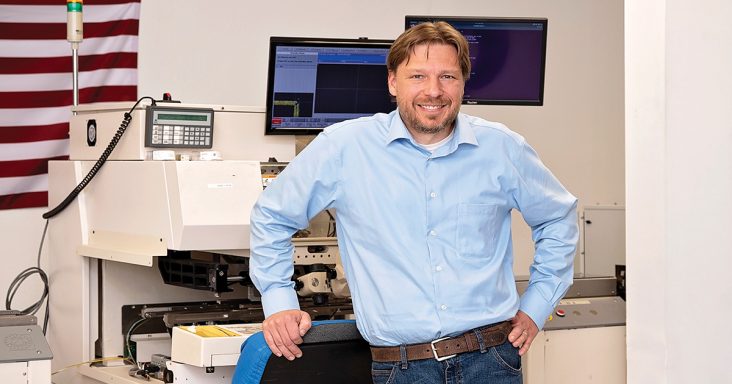Ozark IC designs, manufactures electronics to survive in extreme environments
by June 1, 2021 2:20 pm 1,034 views

Matt Francis founded Ozark Integrated Circuits on Feb. 24, 2011. He earned a doctorate in electrical engineering from the University of Arkansas in 2009.
Fayetteville-based electronics manufacturer Ozark Integrated Circuits (Ozark IC) has marked 10 years as a Northwest Arkansas business. Its mission is to bring the internet of things (IoT) to the edge of extreme environments and create solutions for extreme environment applications, such as those experienced in space and energy exploration, aerospace and industrial controls industries.
The company started as one that would build a new custom solution for each client or problem, but in recent years, it’s worked to design and manufacture proprietary solutions that can be customized based on each client’s needs. The result is an IoT solution that can be produced more rapidly.
Ozark IC’s headquarters comprises 5,300 square feet at the Arkansas Research and Technology Park in south Fayetteville. The company recently developed a manufacturing space where it’s producing its proprietary XNodes. Production capacity ranges from 100 to 1,000 units monthly, and it has partnered for some fabrication and larger volume jobs.
The company has 18 employees, and 2020 was its first year with a $1 million payroll. It nearly doubled its revenue to $2 million last year and has top-line expectations of between $3 million and $3.5 million for 2021.
CEO Matt Francis founded Ozark IC on Feb. 24, 2011. The Tulsa, Okla., native previously was a software engineer for Hewlett-Packard and an applications consultant for startup Lynguent Inc. He earned a doctorate in electrical engineering from the University of Arkansas in 2009.
Francis, 41, who serves on the Elkins City Council and is east area chair for Region 5 of the Institute of Electrical and Electronics Engineers, recently discussed Ozark IC’s successes, plans and industry trends.
 Jeff Della Rosa: Ozark IC is celebrating its 10th anniversary this year. What does this milestone mean for your company, and is Ozark IC officially no longer a startup?
Jeff Della Rosa: Ozark IC is celebrating its 10th anniversary this year. What does this milestone mean for your company, and is Ozark IC officially no longer a startup?
Matt Francis: I ask that myself quite a lot. When do you graduate and not become a startup? As far as a milestone, the big thing is in our 10th year we’re producing our own products internally. As far as feeling like we’re starting to step out of the startup to … a grown-up company [Laughs] … But if you ask anyone here what they’re most proud of is getting our first hardware products out the door. And doing that during a very challenging year is a very big accomplishment.
JDR: How has the pandemic affected your business?
MF: It’s increased it. And it’s increased interest in what we do. We’ve been talking about this transfer … to the digital office and digitizing our enterprises. That accelerated so fast last year — faster than anyone could have imagined, by necessity. Now, you want everything to be digital, and have a true digital enterprise. That means you need to digitize your jet engines. You need to digitize your oil, gas [and] geothermal wells [and] reactors.
JDR: Sounds like a good time to be in electronics manufacturing.
MF: Certainly, domestically. A lot of what we do is focused toward military and aerospace markets, and the domestic supply chain there is critical. That’s one of the reasons we’ve decided to be a manufacturer. We’re excited to be a part of that being reborn industry here in the U.S.
JDR: How has the recent semiconductor shortage impacted your business?
MF: Supply chain has always been a struggle for doing rugged computing like we do. It’s more of a niche. We’ve had deliveries delayed anywhere from three to six months from unavailability to get parts. It’s been interesting to see this recognition of the supply chain in this area. A lot of what we do touches things like automotive. These are the critical things that make the world go ’round. This isn’t the stuff you touch when you use your cellphone. This is the stuff that makes your engine work in your car, makes the airplanes fly, makes the power plants work. It’s critical infrastructure, and we need to make sure it’s secure and available.
JDR: What current projects are you most excited about?
MF: There’s a lot of applications in extreme environments — high temperature, vibration, radiation — and there’s a lot of similar needs. Some of the areas we’re getting into I think are interesting are geothermal energy exploration. That’s a huge opportunity for clean base-load power [that] could have a big impact in Arkansas. We just started a big project for DARPA looking at applying our technology for hypersonics and even start applying it for molten salt reactors. Generation of energy, conversion of energy, propulsion — the work we’re doing in those areas [is] exciting.
JDR: Why has Ozark IC been so successful?
MF: We’ve stayed focused on the area of high-temperature electronics. When we started 10 years ago, a lot of people were getting out of it because of where the oil industry was … We were able to weather through that and keep developing and keep working. Now, as we’re coming out of COVID and other things, there’s more interest in remote control, remote monitoring, green-energy applications and improved efficiency. I think that is the primary thing that feeds a lot of our success.
JDR: Ozark IC recently won the second stage of the American-Made Geothermal Manufacturing Prize. How’s the company progressing in the third stage of the competition, and when will the results for this stage be announced?
MF: This is the really exciting stage. This is where we get to build our idea. We have a bit more time on this. Our submission will go in the fall, and before the end of the year, we should hear back on if we get to the next stage.
JDR: What led you to start Ozark IC?
MF: I’ve always been interested in entrepreneurship. Luckily, [I’ve] had a chance to do a lot of things: I’ve worked in research. I’ve worked in government labs. I worked for, at the time, the biggest tech company in the world, which was HP [Hewlett-Packard]. And I worked for a startup. The thing I learned was I like small business. You’re resource-limited, but you have a lot of freedom. That fits my nature to a tee. I like to figure out ways to make what you can with what you have.
JDR: Have your company goals changed over the years, and if so, how so?
MF: One of my primary goals with starting the company was I wanted to do this kind of work and do it in Arkansas. At the time, there wasn’t anywhere to work that was doing this. That’s still a thing shared by a lot of folks at Ozark. We’ve got deep ties to Arkansas. My parents are from Arkansas. I’m sort of an Arkansas refugee. [Laughs] They left Arkansas right before I was born, and then I got to come back to school here. Didn’t grow up here, but it feels like home.
As the company’s grown and we started to figure out we’re developing some unique solutions and figuring out some hard problems, our goals shifted more toward how can we best serve our customers and how can we best grow the company to serve those needs in a scalable way. The next 10 years are going to be a challenge, but they are exciting because I think we’re right on the cusp of a lot of exciting applications of all this work we’ve done.
JDR: Where do you see the company 10 years from now?
MF: We feel good about the trajectory we’re on. We’re almost over doubling revenue every year right now. We’re starting to establish our commercial business. We’ve been heavily focused in the first 10 years on R&D … That’s still a very healthy part of our business, but I think the next 10 years are about growing the rest of the business: starting to serve a lot more customers, building support, manufacturing, sales teams, and we’re excited about doing that here in Arkansas.
